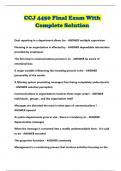Contractual Certainty and Frustration
March 19, 2023
1 Contractual Certainty
• A contract that lacks certainty is void (see Guthing v Lynn, (1831) 2 B7
Ad 232 ).
• An uncertain contract can either be vague or incomplete.
• A vague contract is one which is too imprecise.
• An incomplete contract is one which fails to address key contractual issues.
• So, you can have a vague but complete contract, and you can have detailed
but incomplete contract.
2 Vagueness
• In their attempts to accord meaning to vague terms of a contract, impor-
tantly, the courts will not consider the subjective intentions of the parties
when they determine questions of meaning.
• Rather, the courts’ task is to work out what a reasonable person would
have taken the parties to have meant by them.
• Indeed, in Scammell v Ouston [1941] AC 251, the agreement ‘on hire
purchase terms‘ could not be enforced as, even though each of the parties
clearly had their own idea of what this meant, there was no any evidence
to suggest there were any standard terms which could be regarded as the
ones they could both be taken to mean.
• In their attempts to accord meaning to the contract without altering it,
the courts will consider the following.
• (a) Use of Business Customs and Trade Usages.
• In Hillas v Arcos (1932) 147 LT 503, the court used customs, trade usage,
and the previous dealings of the parties to determine that the term to
provide timber ‘of fair specification’ was not too vague.
1
, • (b) Reasonableness.
• In Hillas, by applying the standard of reasonableness and objective stan-
dards of quality to the phrase ‘of fair quality,’ Lord Tomlin determined
that the contract was not too vague to uphold.
• That said, in Baird Textile Holdings v Marks Spencer [2001] EWCA 274,
the court had to determine whether the term to ‘...acquire [goods] at
quantities and at prices which in all the circumstances were reasonable’
was too vague.
• Here, the court held that the term was too vague as there was no objective
standard by which it could decide whether goods had been acquired at
quantities and at prices which in all the circumstances were reasonable.
• Similarly, in Lee-Parker v Izzet (No. 2) [1972] 1 WLR 775, the court held
that the term relating to the purchaser obtaining a satisfactory mortgage
was too vague as there was no objective standard that could be used to
determine whether a mortgage was satisfactory.
• (c) Severability.
• In Nicolene Ltd v Simmonds, [1953] 1 QB 543, where the sale was subject
to usual conditions of acceptance, the court ignored the phrase because it
was meaningless as there no such conditions and upheld the other parts
of the contract.
• Similarly, a self-contradicting arbitration clause in ERJ Lovelock v Expor-
tles [1968] 1 Lloyd’s Rep 163, was disregarded as it was meaningless to
validate the other provisions.
3 Incompleteness
• Not every omission renders a contract too incomplete to enforce; the law
does not expect parties to cover every last detail when they agree the
terms of a contract.
• As such, issue of completeness is one of degree.
• Since the identification of both a period of a lease and property in con-
veyance are important, if these areas are uncertain, the contract may not
be upheld (Harvey v Pratt, [1965] 1 WLR 1025 ).
• However, as the price in a sale of goods may not be that critical, if this
area is uncertain in a contract, it may be upheld (8(2) of the Sale of Goods
Act of 1979).
• The law will strive to uphold contracts, and they will be deemed unen-
forceable only if they are either unworkable or too uncertain without the
term in question being added in.
2
, • Indeed, as said in Pagnan SpA v Feed Products Ltd [1987] 2 Lloyd’s Rep
601, ‘...the parties are to be regarded as masters of their contractual fate:
it is their intentions which matter and to which the court must strive to
give effect.’
• Regardless, when attempting to rectify the issue of completeness, the
courts will consider the following.
• (a) Determination by Contracting Parties.
• Where the clause provides for resolution of an incomplete provision, such
as valuation, by one of the contracting parties, the contract may be valid.
• In Foley v Classique Coaches Ltd, [1934] 2 KB 1, the clause in question
stipulated that ‘at a price [of petrol] agreed by the parties from time to
time,’ where an arbitration clause provided resolutions for a failure to
agree a price.
• And, in May and Butcher Ltd v The King, [1934] 2 KB 17, the clause
in question stipulated that ‘at prices, dates of payment and manner of
delivery to be agreed from time to time,’ where an arbitration clause
provided for the resolution of disagreements over price.
• In Foley, the clause was held to be enforceable; whereas, in May, the clause
was held to be unenforceable.
• While both the cases had an arbitration clause, what distinguished Foley
from May was that the arbitration clause in the former was to apply in
cases of failure to agree on a price (a certain mechanism) as against the
arbitration in the latter which was to be triggered in case of dispute over
disagreement about the price.
• (b) Determination by Third Party or Mechanism.
• If the parties agree on an objective mechanism for determining the contract
price, such as appointing a third party to act as a valuer, it will not be
void for uncertainty (see Sudbrook Trading Estate v Eggleton [1983] 1 AC
444 ).
• These scenarios relate quite closely to interim agreements.
• In these types of agreements, with complex agreements such as ones to
build reservoirs, for example, the parties will often agree the main terms
in advance and incorporate them into Heads of Terms.
• It is then the parties’ lawyers who negotiate and determine the agreement.
• Moreover, with complex agreements, work may begin before the final
agreement is reached.
3
March 19, 2023
1 Contractual Certainty
• A contract that lacks certainty is void (see Guthing v Lynn, (1831) 2 B7
Ad 232 ).
• An uncertain contract can either be vague or incomplete.
• A vague contract is one which is too imprecise.
• An incomplete contract is one which fails to address key contractual issues.
• So, you can have a vague but complete contract, and you can have detailed
but incomplete contract.
2 Vagueness
• In their attempts to accord meaning to vague terms of a contract, impor-
tantly, the courts will not consider the subjective intentions of the parties
when they determine questions of meaning.
• Rather, the courts’ task is to work out what a reasonable person would
have taken the parties to have meant by them.
• Indeed, in Scammell v Ouston [1941] AC 251, the agreement ‘on hire
purchase terms‘ could not be enforced as, even though each of the parties
clearly had their own idea of what this meant, there was no any evidence
to suggest there were any standard terms which could be regarded as the
ones they could both be taken to mean.
• In their attempts to accord meaning to the contract without altering it,
the courts will consider the following.
• (a) Use of Business Customs and Trade Usages.
• In Hillas v Arcos (1932) 147 LT 503, the court used customs, trade usage,
and the previous dealings of the parties to determine that the term to
provide timber ‘of fair specification’ was not too vague.
1
, • (b) Reasonableness.
• In Hillas, by applying the standard of reasonableness and objective stan-
dards of quality to the phrase ‘of fair quality,’ Lord Tomlin determined
that the contract was not too vague to uphold.
• That said, in Baird Textile Holdings v Marks Spencer [2001] EWCA 274,
the court had to determine whether the term to ‘...acquire [goods] at
quantities and at prices which in all the circumstances were reasonable’
was too vague.
• Here, the court held that the term was too vague as there was no objective
standard by which it could decide whether goods had been acquired at
quantities and at prices which in all the circumstances were reasonable.
• Similarly, in Lee-Parker v Izzet (No. 2) [1972] 1 WLR 775, the court held
that the term relating to the purchaser obtaining a satisfactory mortgage
was too vague as there was no objective standard that could be used to
determine whether a mortgage was satisfactory.
• (c) Severability.
• In Nicolene Ltd v Simmonds, [1953] 1 QB 543, where the sale was subject
to usual conditions of acceptance, the court ignored the phrase because it
was meaningless as there no such conditions and upheld the other parts
of the contract.
• Similarly, a self-contradicting arbitration clause in ERJ Lovelock v Expor-
tles [1968] 1 Lloyd’s Rep 163, was disregarded as it was meaningless to
validate the other provisions.
3 Incompleteness
• Not every omission renders a contract too incomplete to enforce; the law
does not expect parties to cover every last detail when they agree the
terms of a contract.
• As such, issue of completeness is one of degree.
• Since the identification of both a period of a lease and property in con-
veyance are important, if these areas are uncertain, the contract may not
be upheld (Harvey v Pratt, [1965] 1 WLR 1025 ).
• However, as the price in a sale of goods may not be that critical, if this
area is uncertain in a contract, it may be upheld (8(2) of the Sale of Goods
Act of 1979).
• The law will strive to uphold contracts, and they will be deemed unen-
forceable only if they are either unworkable or too uncertain without the
term in question being added in.
2
, • Indeed, as said in Pagnan SpA v Feed Products Ltd [1987] 2 Lloyd’s Rep
601, ‘...the parties are to be regarded as masters of their contractual fate:
it is their intentions which matter and to which the court must strive to
give effect.’
• Regardless, when attempting to rectify the issue of completeness, the
courts will consider the following.
• (a) Determination by Contracting Parties.
• Where the clause provides for resolution of an incomplete provision, such
as valuation, by one of the contracting parties, the contract may be valid.
• In Foley v Classique Coaches Ltd, [1934] 2 KB 1, the clause in question
stipulated that ‘at a price [of petrol] agreed by the parties from time to
time,’ where an arbitration clause provided resolutions for a failure to
agree a price.
• And, in May and Butcher Ltd v The King, [1934] 2 KB 17, the clause
in question stipulated that ‘at prices, dates of payment and manner of
delivery to be agreed from time to time,’ where an arbitration clause
provided for the resolution of disagreements over price.
• In Foley, the clause was held to be enforceable; whereas, in May, the clause
was held to be unenforceable.
• While both the cases had an arbitration clause, what distinguished Foley
from May was that the arbitration clause in the former was to apply in
cases of failure to agree on a price (a certain mechanism) as against the
arbitration in the latter which was to be triggered in case of dispute over
disagreement about the price.
• (b) Determination by Third Party or Mechanism.
• If the parties agree on an objective mechanism for determining the contract
price, such as appointing a third party to act as a valuer, it will not be
void for uncertainty (see Sudbrook Trading Estate v Eggleton [1983] 1 AC
444 ).
• These scenarios relate quite closely to interim agreements.
• In these types of agreements, with complex agreements such as ones to
build reservoirs, for example, the parties will often agree the main terms
in advance and incorporate them into Heads of Terms.
• It is then the parties’ lawyers who negotiate and determine the agreement.
• Moreover, with complex agreements, work may begin before the final
agreement is reached.
3







